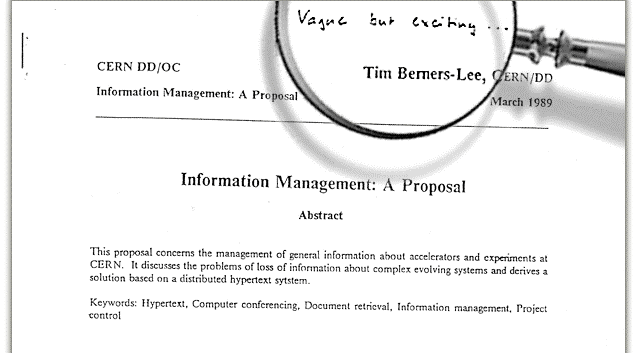
12 March 2019 marked the 30th anniversary of Tim Berners-Lee’s proposal envisioning a unifying structure for linking information across different computers using hypertext, which by 1991 had been developed and became known as the World Wide Web. The day was marked by three celebratory events around the world, all attended by Tim: at CERN in Switzerland, at the Science Museum in London, and in Lagos, Nigeria.
The first event at CERN was a series of three discussions with leading players in the development of the web.
The first discussion was amongst early developers. With TBL were:
- Jean-François Groff, who helped Tim develop the web technology;
- Robert Cailliau, a Belgian informatics engineer who proposed a hypertext system for CERN and collaborated with Tim on the development of the web; and
- Lou Montulli, author of the Lynx browser, founding engineer at Netscape, best known as the creator of web cookies, but also responsible for several foundational web technologies and standards.
They were joined by Zeynep Tufekci, an associate professor at the University of North Carolina, and a leading commentator and analyst on the state of the web.
TBL then engaged in conversation with Bruno Giussani, the Global Curator of the TED conferences, on how to fix the web before flying off to London for the second event.
The final discussion at CERN continued looking at the problems the web faces.
The full video of the event (at 2 hr 27 min) is worth watching by anyone concerned with understanding the web, its current challenges and how they might be addressed.
Dysfunctions of the web
TBL broadly sees the following three sources of dysfunction affecting today’s web:
- deliberate, malicious intent, such as state-sponsored hacking and attacks, criminal behaviour, and online harassment;
- system design that creates perverse incentives where user value is sacrificed, such as ad-based revenue models that commercially reward clickbait and the viral spread of misinformation; and
- unintended negative consequences of benevolent design, such as the outraged and polarised tone and quality of online discourse.
And what is required to solve these problems, respectively, is:
- to create both laws and code to minimize this behaviour, just as we have always done offline;
- to redesign systems in a way that changes incentives; and
- to undertake research to understand existing systems and model possible new ones or tweak those we already have.
Re-decentralising the web
At a technical level TBL is leading development of a platform to “re-decentralise” the web. We began with the “read-only” web of information. Then emerged so-called “Web 2.0” which enabled us to write data to the web and enjoy the interactivity we know today. However, we are writing to increasingly centralised databases, giving rise to many of today’s current problems relating to privacy and control.
To re-decentralise the web TBL is developing Solid (derived from “social linked data”). This is “not rocket science”, just “the web with a few things added”. Another way of looking at it, he suggests, is turning the whole web into “one great Unix system”.
Solid is a proposed set of conventions and tools for building decentralised social applications based on linked data principles. It is modular and extensible and it relies as much as possible on existing W3C standards and protocols.
It will offer true data ownership. Users will have the freedom to choose where their data resides and who is allowed to access it.
Because applications are decoupled from the data they produce, users will be able to seamlessly switch between apps and personal data storage servers, without losing any data or social connections.
And developers will be able to easily innovate by creating new apps or improving current apps, all while reusing existing data that was created by other apps.
Although it will be a while before Solid sees the light of day, it is very much up and running in the lab and in prospect for public launch.
A contract for the web
At a campaigning level, through the World Wide Web Foundation, TBL is calling on governments, companies and individuals to sign up to a “Contract for the web”. This involves committing to a set of principles which aim to help protect the open web as a public good and a basic right for everyone:
“… citizens must hold companies and governments accountable for the commitments they make, and demand that both respect the web as a global community with citizens at its heart. If we don’t elect politicians who defend a free and open web, if we don’t do our part to foster constructive healthy conversations online, if we continue to click consent without demanding our data rights be respected, we walk away from our responsibility to put these issues on the priority agenda of our governments.”
The 30th birthday of the web falls just as we reach the milestone of half of the world’s population being online. Ensuring the other half are able to connect is an important subset of the Contract’s principles:
“The fight for the web is one of the most important causes of our time. Today, half of the world is online. It is more urgent than ever to ensure the other half are not left behind offline, and that everyone contributes to a web that drives equality, opportunity and creativity.”
Nick Holmes is Editor of the Newsletter. Email nickholmes@infolaw.co.uk. Twitter @nickholmes.